Salt Spring Island is in the Province of British Columbia and has virtually no land ownership restrictions legislated. Salt Spring Island has property owners from all over the world. A real estate purchase can be simple and stress-free with the services of a licensed and experienced realtor and with the aid of a professional accountant or lawyer that specializes in none resident purchases. Proper per-immigration tax planning may establish attractive tax shelters in what is potentially a high tax country but where tax advice would offset this as a difficult liability.
Generally, nonresidents staying in Canada for six months or less are considered by the government to be tourists or nonresidents. US citizens do not need a visa to enter Canada.
If you plan on staying for longer than six months per year, immigration status needs to be applied for.

In addition to the property transfer tax, if you’re a foreign national, foreign corporation or taxable trustee, you must pay the additional property transfer tax on your proportionate share of a residential property’s fair market value if the property is within specified areas of BC and yes Salt Spring falls within the CRD and yes one would pay the tax rate of 20% on the fair market value of your proportionate share.
If you are going to rent out your home please note property rent is subject to a withholding tax of 25% of the gross rental income for non-residents. You may elect to file a Canadian tax return to recover any excess tax. Please see an accountant to help with these matters.
Selling a Canadian property has tax implications with Canada’s federal capital gains tax if the residence is a second or third home and not the principal residence. Due to the American/Canadian Tax Convention Agreement, a tax credit in America is in place for income paid to Revenue Canada.
Finding a lawyer specializing in real estate law, tax law, and non-resident issues is advised. Scott Simmons can assist with this if needed and has experience with non-resident buyers and sellers. As a realtor, Scott is well versed in explaining HST (Provincial Sales Tax), PTT (Property Transfer Tax), and the procedures of purchasing or selling, whether it be an explanation of the mortgage system or what may be expected in a typical contract of sale.
When you sell the property, a Canadian lawyer handling the sale will withhold 25% of the gross proceeds – this isn’t 25% of the gain, it’s 25% of the gross proceeds. The reason the lawyer must withhold this amount is that you are required to obtain a clearance certificate from the Canada Revenue Agency (CRA) before they can release any funds, if the clearance certificate is not obtained, the lawyer is required to remit that 25% of the gross proceeds to the CRA. In order to apply for the clearance certificate, you must file a T2062 within 10 days of the transfer date, failure to do so will (in addition to as noted above with the funds being sent to the government) result in penalties being applied at a rate of $25/day (minimum $100 penalty) to a maximum of $2500 – the fact that the lawyer remitted the funds does not absolve you of the filing requirement and the clock will continue to tick on penalties. In filing the T2062 you will be required to provide evidence of cost (purchase agreement) and sale (sales agreement) and will be required to remit 25% of the GAIN (which is obviously better than 25% of the gross proceeds).
Save every recipe for every bit of work you do on the home and or land. CRA will be taxing you on the GAIN you make you can deduct most maintenance and or renovation expenses. Check with an accountant when you buy.
Once the above has been done and the estimated tax paid, the CRA will issue the certificate and the lawyer can release the remaining funds.
You will still be required to file a personal income tax to Canada, paying federal rates between 15% – 30%, if your gross tax remitted with the T2062 is more than your ultimate liability on filing the tax return, the difference would be refunded.
As for your US reporting, since the property is in Canada, Canada gets the first crack at the tax, any tax paid to Canada can be claimed as a foreign tax credit on your US return against any tax the US would levy on the same gain (likely, not exact since Canada taxes 50% of the gain at marginal rates whereas the US would tax 100% of the gain at LTCG rates), which prevents you from paying the same tax twice.
Lawyers
Mullin DeMeo
Brendan Piovesan
Toll free 1-877-477-3327
Tel 250-477-3327
Fax 250-477-0980
Web Site
McConnan Bion O’Connor & Peterson
1-888-385-1383
1-250-385-1383
Web Site
Accountants
Howland Tax Service International
#3 – 52 Moss Street
Victoria, BC
Canada
V8V 4L8
T 1-250-999-4023
F 1-650-479-8955
Web Site
Schell and Associates CGA
204-2840 Nanaimo St, Victoria, BC, V8T4W9
1.250.385.0312 – T
1.250.386.4267 – F
Web Site
Cheers,
Scott & June Simmons
The Salt Spring Team
